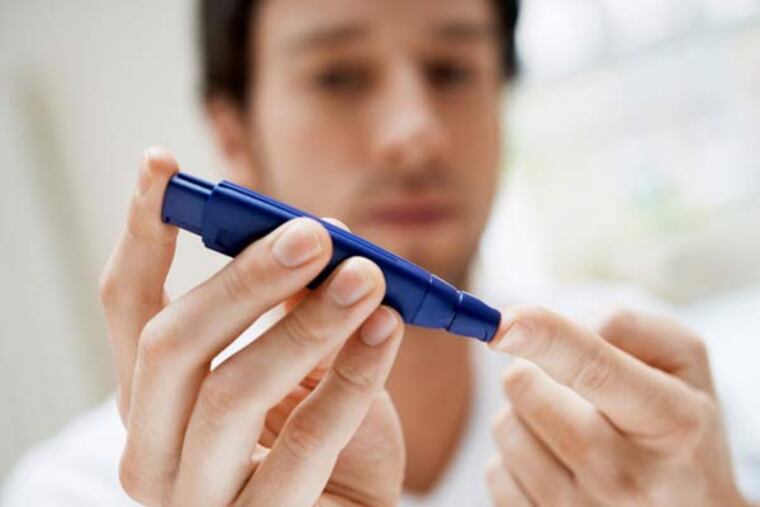Steps to help teenagers cope with diabetes
For Christina Williams, 19, rebellion against type 1 diabetes set in during her middle school years. "I would refuse to test, refuse to give myself my insulin doses," the Pennsburg teen said. "I wanted to have a normal life and live just like my friends without diabetes."

For Christina Williams, 19, rebellion against type 1 diabetes set in during her middle school years.
"I would refuse to test, refuse to give myself my insulin doses," the Pennsburg teen said. "I wanted to have a normal life and live just like my friends without diabetes."
The result was consistently elevated blood glucose, which translated into constant tiredness for Williams, a competitive swimmer.
What finally turned the Lock Haven University sophomore around was her diabetes educator telling her during her freshman year of high school that if she wanted to think about driving a car, she had to lower her A1C, the test that shows the average of blood glucose readings spanning three months. Gradually, she realized the "diabetes wasn't my parents' fault, that it was not going anywhere, and I'm going to have to deal with it."
"One of the main tasks of a teenager is becoming independent of your parents," said Martha Bardsley, a pediatric endocrinologist at Nemours Children's Health System. "But kids with health issues need support, which is a really difficult thing to balance with independence."
About 208,000 Americans under age 20 are estimated to have been diagnosed with diabetes, according to the 2014 National Diabetes Statistics Report. In 2008-09, the annual incidence of diagnosed diabetes in youth was estimated at 18,436 with type 1 diabetes, in which the body makes no insulin; and 5,089 with type 2 diabetes, in which insulin production is compromised.
Dealing with diabetes is tough at any age, but for teenagers, it can be particularly tricky. Puberty, hormonal changes, and adolescent stress can make blood-sugar control extra difficult.
In addition, type 1 diabetes management requires many daily actions, including monitoring blood-glucose readings, counting carbohydrate intake, and calculating insulin shots. Teens with type 2, frequently associated with obesity, might face dietary restrictions and have to take daily medication.
"These tasks are hard for adults who have some sort of wisdom that forces them to do tasks that are important even when they don't feel like doing them," said Melissa Rearson, a pediatric nurse practitioner at Children's Hospital of Philadelphia. "But because kids don't have this wisdom, they're doing these things out of habit. You can't tell them what bad things will happen to them if they don't take care of diabetes - they'll say those things just happen to old people."
Many teens tend to focus on how annoying the daily rituals are, putting parents - who might harbor guilt over their children's illness - in the difficult role of taskmaster, Rearson said.
"The goal is to figure out how to monitor kids without stepping on their freedom and autonomy," she said.
Some adults might hover over children eager to be independent, and teenagers who need their parents' support might reject it. Other parents might step back too far, putting care in jeopardy.
None of this is helped by a "ton of resentment and anger towards the disease, which can be magnified in the teenage years," Bardsley said.
"How can you not be angry about it?" she asked. "It doesn't go away. It's there when you get up in the morning; it's there all day."
To help teens cope with diabetes, experts suggest:
A change in technology. A new Dexcom continuous monitoring system that can share blood sugar readings automatically via the cloud with parents or providers might offer teens more support, said Bardsley. Other patients may feel that they have more control if they switch to an insulin pen.
Make a game plan. Bardsley asks teens what time of day a parent can ask about a blood-sugar reading and what exact words she can use. "Parents don't realize that if they ask in a slightly different way, it would be OK."
Keep it together. Store all testing and medical equipment in an area easily accessible to teens and family members. Rearson suggested teens keep blood-sugar meters with their phones or even carry them in their UGG boots.
Reframe your reactions. Rearson advises parents to stay calm rather than cast blame if a reading is high. "Say, 'Thank you for testing. What are we going to do about a 400? Let's take insulin now and we'll be OK in two hours.' If kids get a response that isn't incriminating, they will be more likely to pay attention and take their sugars."
Stay on top of blood-sugar readings. "With a 2-year-old, you might check in every time. With a 10-year-old, maybe every other time. With a 15-year-old, maybe once in every three days. Make it developmentally progressive," Rearson said.
Talk about college for a couple of years before it actually happens. Ask teens how they will manage sickness. Or drinking. How will they count carbs in a dining hall?
Williams said the transition to college proved a little difficult.
"It was awkward at first to tell your friends about your diabetes, but your friends become your family at college," Williams said. "I explained that I had to shoot insulin before meals and showed them how to give me glucagon shots."
Her advice for the parents who have asked her what to do about kids who won't take care of their diabetes?
"I tell them to try to make their children more independent," she said. "Make it easy for them until it clicks for them that they have to take over their care. They'll get it eventually."
215-470-2998